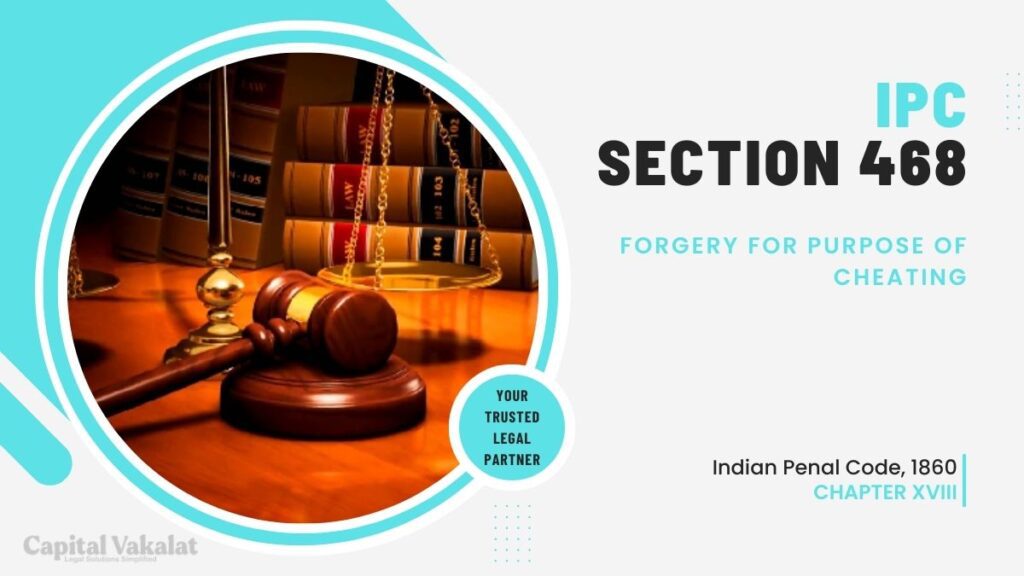In the complex realm of legalities, Section 468 of the Indian Penal Code (IPC) stands as a formidable force against forgery for the purpose of cheating.

This article explores the nuances of Section 468, shedding light on its definition, elements, legal consequences, and the profound impact it can have on individuals and society.
Understanding Forgery
Forgery, in the legal context, involves the creation, alteration, or imitation of a document with the intent to deceive. Section 468 of the IPC specifically deals with forgery committed for the purpose of cheating. To comprehend the implications of this section, it is crucial to delve into its definition and the elements that constitute an offense.
Definition of Section 468 IPC
Section 468 of the IPC defines the offense of forgery for the purpose of cheating. It encompasses a broad spectrum of acts related to fraudulent documents, emphasizing the intent to deceive for personal gain. Understanding the legal language of this section is pivotal in navigating the intricacies of cases involving forgery.
Elements of Forgery for Cheating
For an offense to fall under Section 468, certain elements must be present. Examining these elements provides insight into the specific circumstances that constitute a violation. From the creation of false documents to the use of deceptive means, each element contributes to the overall understanding of the offense.
Types of Documents
Forgery is not confined to a specific type of document; rather, it spans a wide array, including financial instruments, legal agreements, and official certificates. Exploring the diverse types of documents involved in forgery cases unveils the modus operandi employed by individuals seeking to deceive others for personal gain.
Legal Consequences
The repercussions of being found guilty under Section 468 are severe. Legal consequences range from fines to imprisonment, depending on the gravity of the offense. This section acts as a deterrent, emphasizing the commitment of the legal system to uphold the integrity of documents and protect individuals from fraudulent activities.
Case Studies
Real-life case studies provide practical insights into how Section 468 is applied in different scenarios. Examining these cases not only elucidates the legal processes but also highlights the impact forgery can have on victims and society at large.
Importance of Proving Intent
Central to cases under Section 468 is the need to establish intent. Proving that the act was committed with the deliberate purpose of cheating is a challenging yet pivotal aspect of legal proceedings. Understanding how intent is determined adds a layer of complexity to forgery cases.
Investigative Challenges
Law enforcement faces unique challenges when investigating cases related to forgery for cheating. From tracing the origin of forged documents to establishing a chain of events, overcoming these challenges is crucial for successful prosecution.
Prevention Measures
Preventing forgery requires a multi-faceted approach, involving both legal and technological measures. This section explores strategies to safeguard against forgery, emphasizing the importance of proactive measures to mitigate the risks associated with fraudulent activities.
Impact on Individuals
Beyond the legal consequences, forgery for the purpose of cheating can have a profound impact on individuals. From financial losses to reputational damage, understanding the personal toll of such offenses highlights the need for stringent legal measures.
Conclusion
In conclusion, Section 468 of the IPC serves as a robust legal framework to combat forgery for the purpose of cheating. Its comprehensive approach, coupled with the severity of legal consequences, underscores the commitment to maintaining the integrity of documents and protecting individuals from deceptive practices.
Frequently Asked Questions
How can individuals protect themselves from falling victim to forgery?
Vigilance and verification are key. Individuals should verify the authenticity of documents and be cautious in financial transactions.
What role does intent play in forgery cases under Section 468 IPC?
Intent is crucial in determining the severity of the offense. Proving that the act was committed with the intent to deceive is a fundamental aspect of legal proceedings.
Are there specific industries more susceptible to forgery?
While forgery can occur in any industry, financial institutions, and legal sectors are often targeted due to the sensitive nature of the documents involved.
Can forgery cases be settled out of court?
Settlements are possible, but it depends on the parties involved and the willingness to negotiate. Legal advice is recommended before considering such options.